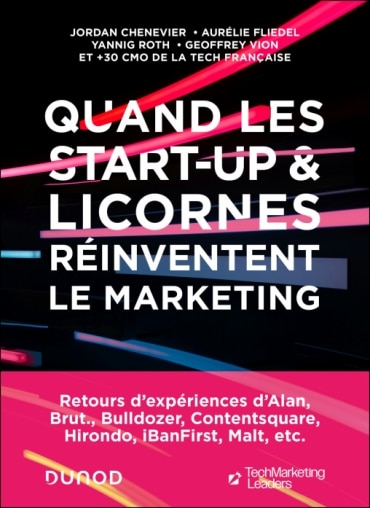
Start-ups and unicorns are redefining the rules of the game by relying on innovation, speed of execution and strategic use of data. Aurélie Fliedel, co-author of “When start-ups & unicorns reinvent marketing” published by Dunod and Chief Marketing Officer at Alan, shares his expertise on the marketing specificities of start-ups and scale-ups.
It highlights the key differences between these young, agile companies and large traditional groups, while offering concrete advice for building strong brands, maximizing customer acquisition and integrating artificial intelligence into marketing strategies.
What are the main differences in marketing strategy between start-ups and traditional companies and large groups that you have experience with?
Aurélie Fliedel: Three strong markers of start-ups and tech companies are:
- innovation
- speed of execution and constant adaptation
- systematic use of data
Start-ups and tech companies are playing on these three dimensions to stand out and beat the historic players on their own turf.
It is also by revolutionizing the way of working that start-ups and scale-ups are reinventing marketing.
By creating agile organizations and cross-functional multidisciplinary teams (whatever their names: Spotify’s “squads”, Alan’s “crews”), start-ups and scale-ups have made it possible to create synergies between all functions of the company to deliver the best possible product.

I am often asked how to successfully complete an online subscription or purchasing process. The subject is thorny, between business objectives, technical constraints (setting up and optimizing the website and its performance), product thinking (defining and optimizing conversion tunnels, identifying blocking points for users, working on the interface and design) and marketing work (defining the right value proposition based on users, creating the right messages consistently throughout the journey).
From my experience, the solution lies in a small cross-functional team of 5-6 people bringing together all the skills (product, technical, marketing, design, data, etc.), autonomous and responsible for achieving the business objective.
What types of marketing profiles should you start your start-up with?
Aurélie Fliedel: In a context of rapid growth and innovation, vision is the foundation on which the performance of a marketing team rests. Building a marketing team is not just about aligning technical skills, but about shaping a collective inspired by a common vision and objectives, and finding the right organization to create those little sparks that make all the difference: those of creativity, collaboration, or even resilience.
To start your start-up, my advice is to start with a versatile and generalist profile who will be able to address various subjects: launch the first acquisition campaigns, write the pitch, be on the ground to organize or participate in events, but also meet customers…
What changes should we make when we grow up?
Aurélie Fliedel: Over time, the marketing team is generally structured around key skills such as marketing acquisition, product marketing, content, brand and communication.
The important thing is to be very aligned with the company’s objectives and expand the team as needed. If the priority is to increase brand awareness, you will favor profiles specialized in branding and public relations. If the urgency is the acquisition of new customers, you will certainly recruit profiles specialized in growth and lead generation.
As Alan’s CMO, at a company that puts technology at the center of its product, I can attest to one thing: everything moves very quickly. It is therefore imperative to anticipate needs several months in advance, and also to build a talent pool within your network, to speed up recruitment time when the time comes.
What adjustments and changes in marketing strategy are you implementing for scale-ups?
Aurélie Fliedel: At each stage, marketing strategies will evolve.
Whereas in a start-up that is being created, we will use quick and inexpensive marketing levers, for example to find the product-market fit, in a scale-up we will address different issues:
- expand your playing field by opening new market segments, or even new countries, which will require the implementation of dedicated go-to-market strategies
- increase brand awareness with increasingly ambitious campaigns
- accelerate the acquisition of new customers by focusing on the most profitable levers
- adapt your marketing to a growing team (with more product managers, more salespeople). For example, one of the first initiatives I implemented at Alan was the product feedback loop. That is to say, grouping, structuring and organizing field feedback from salespeople to feed the product roadmap according to customer needs. This is a fundamental step to scale, align the business and product teams, and ensure that the product meets the needs of customers, whatever their industry.
What first tips would you give for building a strong brand?
Aurélie Fliedel: We are in a changing context:
- consumers expect more authenticity
- brands want to reach their audiences where they are, especially on platforms
- influencers and communities are becoming more and more important, and have more and more means with AI to create content for brands and speak on behalf of brands
In this context, my advice for building a strong brand is to build a singular brand identity and adopt a direct, organic approach, relying on social networks, influencer marketing, community creation …
What strategies do you recommend to maximize customer acquisition quickly?
Aurélie Fliedel: The answer will depend on the nature of the business (B2B or B2C, self-serve or sales-serve, etc.), the acquisition strategies will not be the same.
What is important is to clearly define your Ideal Customer Profile, your ideal customer, to listen to them, to understand their problems (those of which they are aware and those that they have not yet formulated), and to understand how your product will be able to respond to them. From there, you can develop an impactful value proposition and roll out an effective acquisition strategy.
Data will also play a vital role in measuring the effectiveness of different acquisition channels and allowing efforts to be focused on those with the best return on investment.
As Alan’s CMO, what customer retention tools have you successfully implemented?
Aurélie Fliedel: At Alan, our watchword is “member first”. All our efforts are focused on providing the best possible experience for our members, and offering the best possible product. This is how we have an NPS of 70. A product that meets the needs and changes the lives of our members is the best customer retention strategy.
What are your tips for good use of social networks for customer acquisition?
Aurélie Fliedel: The magic of social media happens when your audience’s interests meet what you have to say as a brand. By offering well-targeted content, which tells about your brand and your product, while answering your audience’s questions, you have the right recipe for using social networks to increase your notoriety, engage your audience and acquire new customers.
Latest CMO advice?








